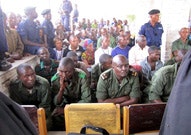Fizi Diary: Reversing the Stigma of Sex Crimes
By Kelly Askin
Some 600 people turned out today to hear the defense stage of the case against Lt. Col. Kibibi Mutware and ten soldiers under his command. They have been charged with rape as a crime against humanity, after they allegedly went on a mass rape and pillage spree in the town of Fizi on New Year's Day.
Standing in the blazing sun for hours on end, the people in the crowd—most of whom had never seen a real trial before—were thoroughly engaged, listening attentively and reacting when witnesses recanted or changed testimony from days before. The five defense attorneys, six civil party representatives, chief military prosecutor, and five military judges were spirited and rigorous in clarifying facts, debating legal minutia, and seemingly determined to get at the truth of what happened and who shared in the responsibility.
The mobile gender justice court, which has been roving around the remote areas of South Kivu, appears to be working as designed. It is providing a measure of justice to the badly victimized population of the Democratic Republic of Congo and offering a domestic setting that complements the work of the International Criminal Court (ICC) in The Hague.
Currently ongoing at the ICC are proceedings against former Congolese rebel leader Thomas Lubanga, as well as against Germain Katanga and Mathieu Ngudjolo Chui for international crimes committed in Ituri. Former Congolese vice president Jean-Pierre Bemba is also on trial, for sexual violence committed in the Central African Republic.
The ICC has also issued an international arrest warrant for Bosco Ntanganda on war crimes charges of conscripting, enlisting, and using child soldiers. The 11 soldiers accused in the Fizi case were members of Ntanganda's rebel group.
The vast majority of trial participants and observers here in Fizi are male, whereas the vast majority of victims are women and girls. Deeply ingrained social and cultural stereotypes are being discussed for seemingly the first time.
Warned that Kibibi and his soldiers planned to attack the town, the men fled, leaving behind the women to take care if the household. At least 50 were raped, most by multiple perpetrators, many in front of their children. Upon returning, most men rejected their wives as spoiled goods, tainted by the perpetrators.
But some in the community are finally recognizing that the women did nothing wrong, and no stigma should attach to them. Indeed, it is the armed men, who preyed upon the unarmed civilian women and girls, who are weak and cowardly and should be shamed and shunned by society. And, if justice is fulfilled, it is they who will go to prison and pay for their insidious crimes. Such a verdict would provide protection to the survivors and hopefully serve as a deterrent to those who believe no one cares if lowly women are sexually assaulted by men. For centuries, it has been simply regarded as the female's fate and the male's right.
Much remains to be done to end the long history of impunity in the DRC and to reverse the stigma and myths surrounding sex crimes and women's rights. The International Criminal Court and the domestic mobile gender court are a huge start, yet they are a drop in the bucket considering the DRC is the site of the deadliest conflict since World War II, with over 5 million people killed.
Until July 2015, Kelly Dawn Askin was senior legal officer for international justice with the Open Society Justice Initiative.
